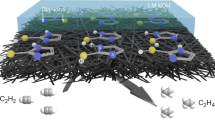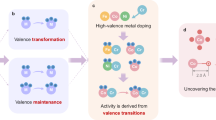Abstract
IN the past, the physical properties of transition metal hydrides have been studied almost exclusively, because the chemical properties appeared to be very similar to those of the parent metals. No clear picture of the nature of the hydrogen species in these compounds has emerged, as there is evidence from the physical properties to support protonic, covalent and anionic models1. This communication describes the reactions of a number of transition metals and their hydrides with organic acid–base and oxidation–reduction indicators.
This is a preview of subscription content, access via your institution
Access options
Subscribe to this journal
Receive 51 print issues and online access
$199.00 per year
only $3.90 per issue
Buy this article
- Purchase on Springer Link
- Instant access to full article PDF
Prices may be subject to local taxes which are calculated during checkout
Similar content being viewed by others
References
Gibb, jun., T. R. P., Progress in Inorganic Chemistry (edit. by Cotton, F. A.), 3, 315 (Interscience, New York, 1962).
Gibb, jun., T. R. P., and Roy, R. J. (to be published).
Benesi, H. A., J. Amer. Chem. Soc., 73, 5490 (1956).
Nineham, A. W., Chem. Rev., 55, 355 (1955).
Bond, G. C., Catalysis by Metals, 29 (Academic Press, London, 1962).
Author information
Authors and Affiliations
Rights and permissions
About this article
Cite this article
ROY, R. Reducing and Basic Nature of Metallic Hydride Surfaces. Nature 212, 811–812 (1966). https://doi.org/10.1038/212811a0
Issue Date:
DOI: https://doi.org/10.1038/212811a0
Comments
By submitting a comment you agree to abide by our Terms and Community Guidelines. If you find something abusive or that does not comply with our terms or guidelines please flag it as inappropriate.



